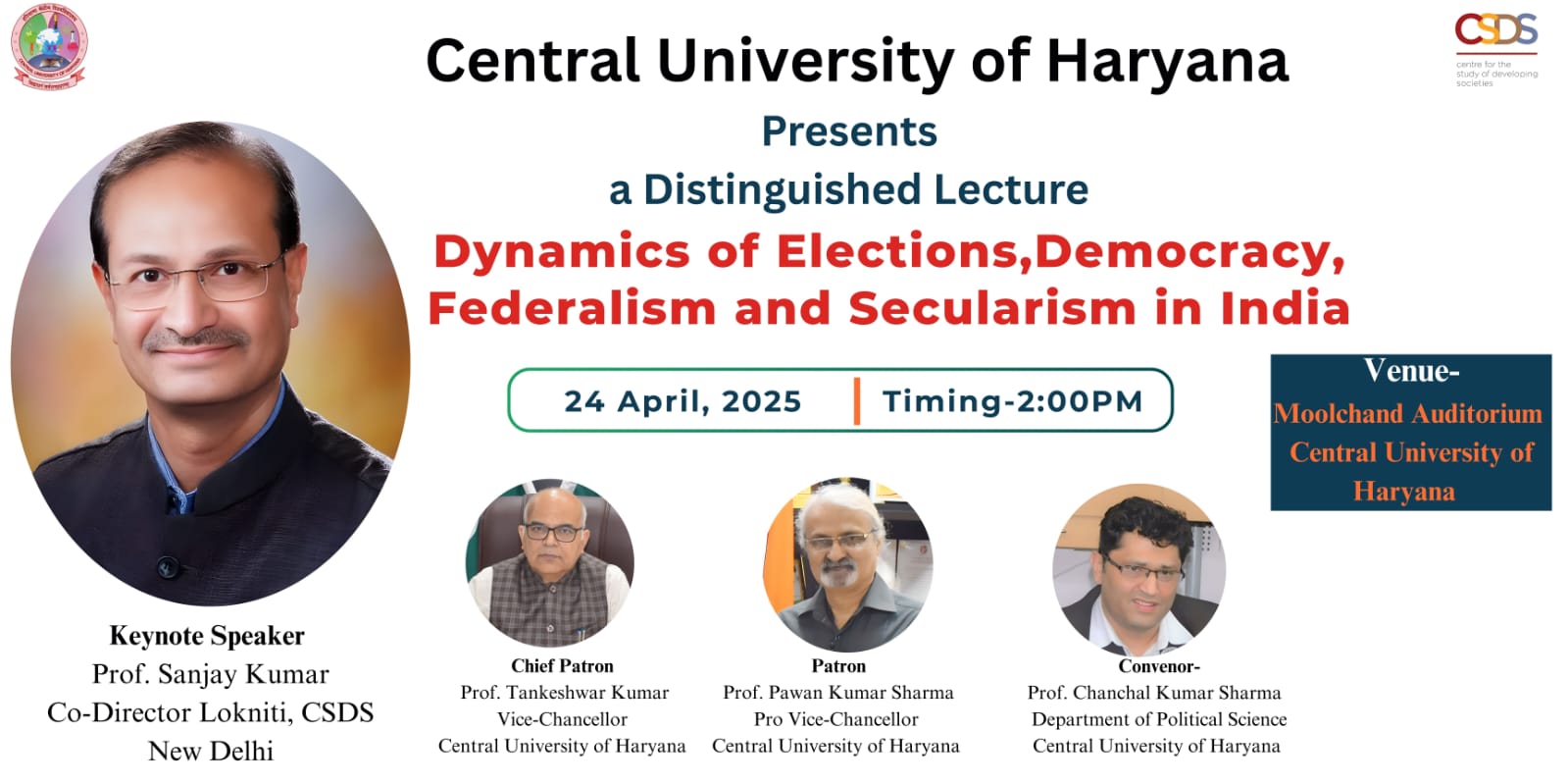 Dynamics of Elections, Democracy, Federalism and Secularism in India.
Dynamics of Elections, Democracy, Federalism and Secularism in India.
Prof.Sanjay Kumar
Professor, Centre for the Study of Developing Societies (CSDS), Delhi
Abstract
It has been more than 75 years since India gained independence in 1947, and Indians exercised their franchise for the first time in 1952 to elect an independent government. This long journey of democracy has witnessed both upheavals and progress, but overall, the past seven decades reflect a strengthening of Indian democracy.
Over this period, Indian elections have shown a consistent trend of increased electoral participation, particularly among marginalized sections of society, such as women and youth. Voter turnout has increased at all levels—Lok Sabha, State Assemblies, and Local Body elections.
Data released by the Election Commission of India shows that women are now turning out to vote in significantly larger numbers than in the past. Whereas earlier there was nearly a 10% turnout deficit between men and women, the 2024 Lok Sabha elections saw almost equal participation between the two. In many states, women even outvoted men—Bihar and Himachal Pradesh being notable examples. Survey findings also reveal increased turnout among young voters.
Surveys conducted by Lokniti-CSDS further indicate that Indians continue to express a considerable degree of trust in Indian democracy, with very little erosion of faith over the last seventy-five years. This resilience persists despite widespread poverty, unemployment, and the everyday hardships faced by many, particularly in rural areas. A large segment of the population associates democracy with the government’s ability to meet basic needs such as access to drinking water, roads, electricity, and healthcare.
The 73rd Amendment to the Constitution granted local bodies legal status, providing them with independent powers and mandating regular elections every five years for the third tier of government—Panchayats and Urban Local Bodies. While some state governments have occasionally been placed under President’s Rule via Article 356 of the Constitution, for the most part, the majority of Indian states have functioned under elected governments responsible for state-level governance.
In the early decades after independence, the Congress party was dominant both at the Centre and in many states. However, since the 1990s, strong regional parties have emerged, including in the Hindi heartland states of northern India, following a trend that had already taken root in southern states such as Tamil Nadu and Andhra Pradesh. The continued strength of regional parties—even in the presence of a highly dominant national party like the BJP—demonstrates the resilience and vitality of India’s federal structure.
About The Speaker
Sanjay Kumar is Professor and Co-Director of Lokniti, a Research Programme at the Centre for the Study of Developing Societies. His core area of research is Electoral Politics, but using survey method as research tool he has been engaged in conducting research on very wide range of themes-Indian Youth, State of Democracy in South Asia, State of Indian Farmers, Slums of Delhi and Electoral Violence.
He has published widely, written several books, edited volumes, contributed chapters for several edited volumes, published articles in various national and international research journals. His most recent book is Elections in India: An Overview. His other publications include Post Mandal Politics in Bihar: Changing Electoral Patterns, Changing Electoral Politics in Delhi: From Caste to Class, (with Praveen Rai) Measuring Voting Behaviour in India, Women Voters in Indian Elections: Changing Trends and Emerging Patterns, Youth in India: Aspirations, Attitudes, Anxieties, Indian Youth and Electoral Politics: An Emerging Engagement, (with Suhas Palshkar and Sanjay Lodha) Electoral Politics in India: Resurgence of the Bhartiya Janata Party, (With Christophe Jaffrelot) Rise of the Plebeians? The Changing Face of Indian Legislative Assemblies and (with Peter R deSouza and Sandeep Shastri) Indian Youth in a Transforming World: Attitudes and Perceptions.
Besides his academic writing he writes regularly for both national and regional newspapers, both in English and Hindi languages. His articles are published regularly in The Hindu, Indian Express, Asian Age, Deccan Chronicles, Dainik Bhaskar, Rajasthan Patrika and The Mint. He is also a well know face on Indian Television as Psephologist and Political Commentator. He has also been an international election observer in many countries.
Convenor
Prof. Chanchal Kumar Sharma
Chanchal Kumar Sharma is Professor of Political Science at the Central University of Haryana, India. He is currently a Visiting India Fellow at the Institute of Asian Studies, German Institute for Global and Area Studies (GIGA), Hamburg, and a Fellow at the Centre for South Asian Studies, University of Edinburgh, U.K. He also serves on the editorial board of Regional and Federal Studies (Routledge, U.K.). His research interests lie in the political economy of federalism, party systems, economic reforms, paradiplomacy, and crisis/conflict management in multi-level systems. His recent work has been published in leading journals including Publius: The Journal of Federalism, Public Administration, Territory, Politics, Governance, International Political Science Review, Political Science (Victoria University of Wellington), Contemporary South Asia, India Review, and Indian Politics and Policy. His research has received support from the German Institute for Global and Area Studies (GIGA), the Leverhulme Trust (U.K.), and the Indian Council of Social Science Research (ICSSR).
Registration Link
